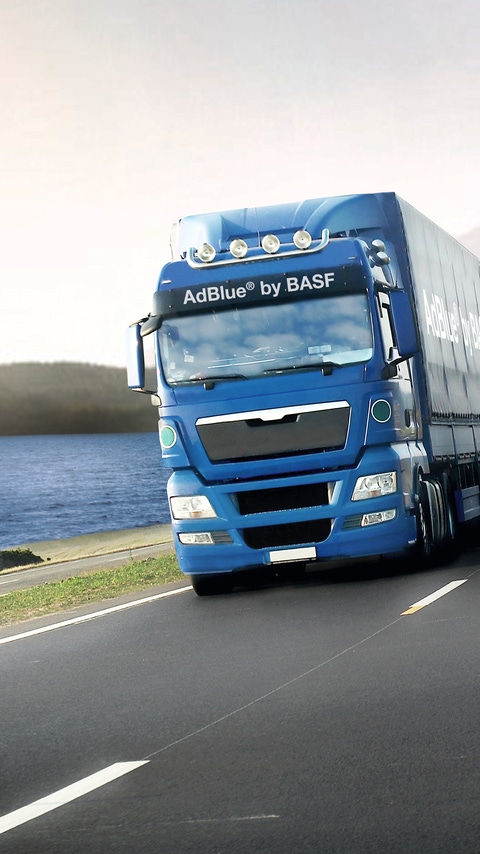Your advantages at a glance
- AdBlue® by BASF meets all EURO 4, 5 and 6 objectives
- Reduced fuel consumption
- Optimized engine output

Products
For several years, the Euro IV, V, VI onwards Standard Emissions Regulations significantly restricted marginal values of exhaust gasses, specifically nitric oxide, from commercial vehicles. Recently, these restrictions included private vehicles. In order to reach these objectives, most European OEMs rely on the well-established Selective Catalytic Reduction (SCR) technology. AdBlue® by BASF can help reduce nitric oxide emissions.
How does AdBlue® by BASF work?
AdBlue® is a high purity, 32.5% urea solution directly injected into the exhaust gas where it serves as reducing agent. The released ammonia subsequently reacts with the nitric oxides on the catalyst to form elementary nitrogen and water; both are natural constituents of the air we breathe. Hence, the amount of nitric oxides in the emission can be reduced.
Reduced fuel consumption and constant engine output
The combination of SCR Catalysts with AdBlue® by BASF needs higher temperatures in the motor to elevate the exhaust gas temperature for the effective AdBlue NOX reduction. This leads to higher fuel efficiency and less unburned fuels and less sooty particles in the exhaust gases without affecting engine output.
AdBlue® by BASF – fit for the future!
AdBlue® by BASF is part of a future-proof concept for the reduction of exhaust emissions. By combining environmental friendliness and cost effectiveness, AdBlue® by BASF meets all EURO IV, V and VI onwards objectives.
To prevent contaminants from impairing the quality, AdBlue® by BASF should be handled only in storage and filling systems intended exclusively for this purpose. Additionally, this handling helps to avoid high testing costs. BASF distributors will be pleased to provide more information.
Since AdBlue® solidifies at -11°C and decomposes at an accelerated rate at temperatures above 25°C, storage and filling systems must be designed to assure a temperature range of between 30 and -11°C.
AdBlue® by BASF is an aqueous solution which poses no hazard under the relevant European chemicals legislation. Furthermore, it is not classified as a hazardous substance under the relevant materials and transport regulations.
Should small quantities of AdBlue® by BASF come into contact with the skin during handling, it can simply be washed off with large quantities of water. A threat to human health can be virtually excluded.
AdBlue® by BASF is easily decomposed by microbes. The hazard which it poses to water and soil is therefore very low. Accordingly, it has been placed in the lowest German water hazard class, WGK 1. Thanks to its outstanding degradability, small quantities of spilled AdBlue® by BASF can simply be flushed into the sewer with large quantities of water.
Provided that the maximum recommended storage temperature of 25 °C is maintained, AdBlue® by BASF continues to meet the requirements of ISO 22241 for at least 12 months after production. Should this recommended storage temperature be exceeded, this period is reduced accordingly. AdBlue® by BASF solidifies at -11°C. When reheated gently, the frozen AdBlue® by BASF returns to the liquid state and can be used as-is with no reduction in quality.
AdBlue ® = registered trademark of the VDA (German Automotive Industry Association). BASF is an extraordinary member of the VDA (German Automotive Industry Association), which owns and licenses the AdBlue ® brand. Only officially approved manufacturers can market diesel exhaust fluid (DEF) under the AdBlue ® name. This innovative product is synonymous with consistently high quality.

